Israel attacks 88 members during a meeting to choose Khamenei’s successor
Israel attacks 88 members during a meeting to choose Khamenei’s successor
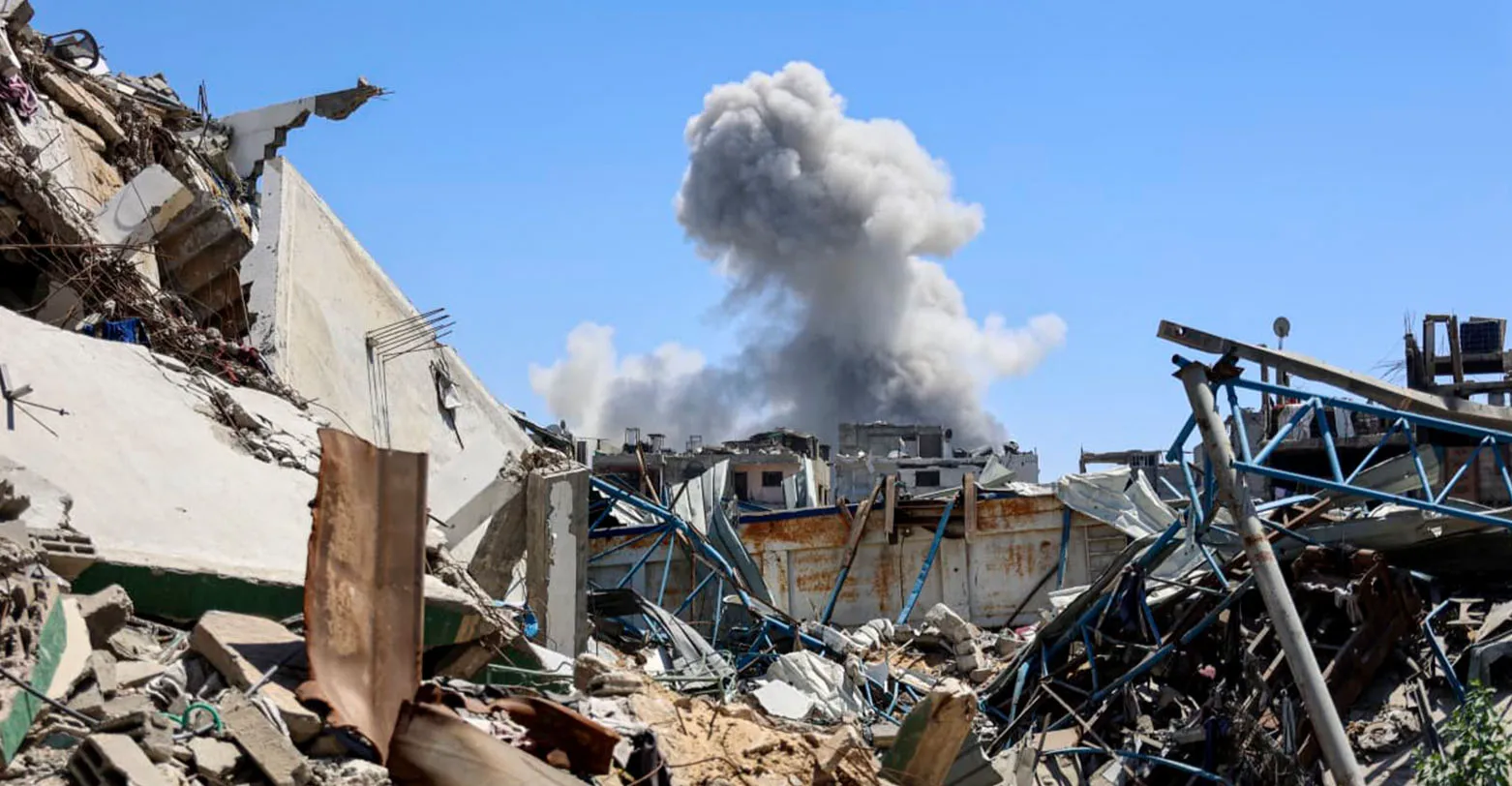 Fox News revealed on Tuesday that Israel targeted a meeting of the Assembly of Experts during a session dedicated to choosing a new Supreme Leader in Iran.
Fox News revealed on Tuesday that Israel targeted a meeting of the Assembly of Experts during a session dedicated to choosing a new Supreme Leader in Iran.
Other media outlets reported that Israel attacked 88 members of the Assembly of Experts in Tehran during a meeting to choose a successor to Ali Khamenei.
In contrast, the Iranian news agency Mehr reported that “the Assembly of Experts building was empty at the moment it was targeted by Israeli aircraft, and no injuries occurred.”
In contrast, Fars News Agency quoted a spokesman for the Iranian Ministry of Defense confirming that “Tehran has put in place a mechanism for pre-arranged leadership alternatives,” noting that “at least three levels of replacements have been appointed for each leader, to ensure the continuity of leadership and prevent any institutional vacuum.”
The United States and Israel launched a war on Iran last Saturday, targeting top Iranian leaders, starting with Supreme Leader Ali Khamenei, his advisor Ali Shamkhani, and military leaders such as the Minister of Defense and the commander of the Revolutionary Guard, through hundreds of missile strikes and suicide drone attacks.
In turn, Iran responded by targeting Israel and American bases in the Gulf states and the Kurdistan region, and then began bombing towers and airports in some Gulf states such as the UAE, Kuwait and Bahrain.
Shafaq.com
An economist proposes urgent solutions to overcome the oil field shutdown crisis.
An economist proposes urgent solutions to overcome the oil field shutdown crisis.
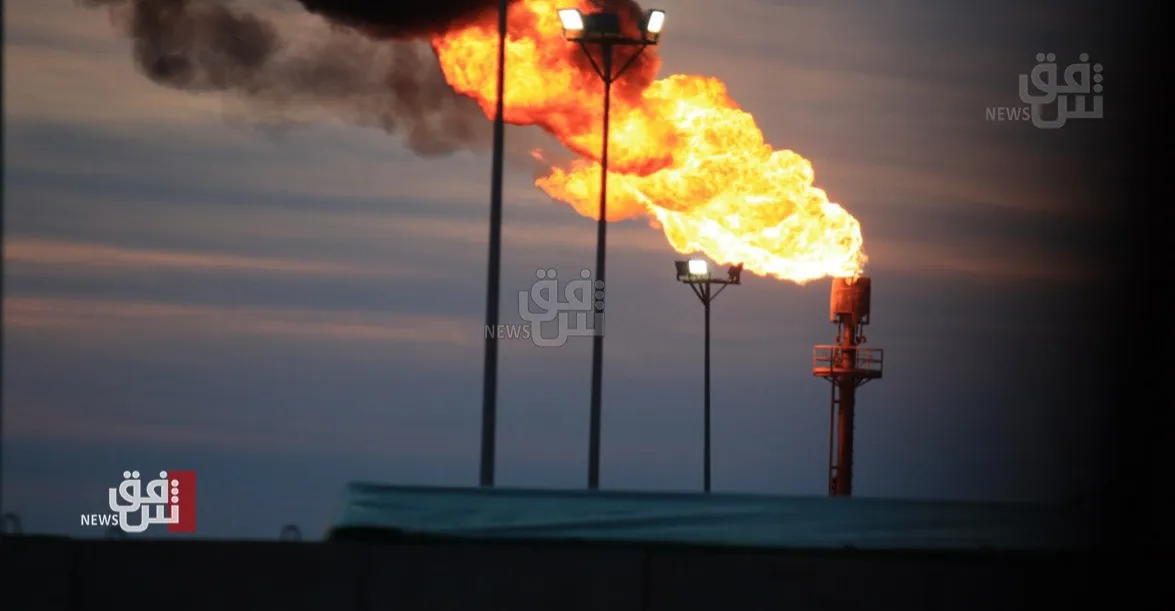 Economic expert Mohammed Al-Hassani confirmed on Tuesday that the closure of some oil fields in Iraq due to full storage tanks and the deteriorating security situation in the Kurdistan Region, coinciding with the disruption of exports through the Strait of Hormuz, represents a complex financial challenge that threatens the cash flows of the state, which depends on more than 90% of oil revenues.
Economic expert Mohammed Al-Hassani confirmed on Tuesday that the closure of some oil fields in Iraq due to full storage tanks and the deteriorating security situation in the Kurdistan Region, coinciding with the disruption of exports through the Strait of Hormuz, represents a complex financial challenge that threatens the cash flows of the state, which depends on more than 90% of oil revenues.
Al-Hassani told Shafaq News Agency that “stopping production in major fields such as the Rumaila field or the northern fields doubles the daily losses, not only in terms of lost revenues, but also because of the technical costs of stopping and restarting the wells, as well as the risk of losing regular customers in Asian markets.”
He pointed out that “talking about (accelerating the sale) becomes of limited effectiveness in light of the disruption of one of the most important maritime routes, which necessitates focusing on financial and logistical alternatives, most notably using the temporarily available storage capacities to avoid closing more wells, in addition to the option of selling on credit by marketing future shipments with short-term contracts to secure immediate liquidity, which is a mechanism that allows the government to obtain advance payments in exchange for supplying subsequent quantities when exports resume, which helps to bridge the cash gap in the short term.”
According to Al-Hassani, another urgent solution is to reschedule unnecessary financial obligations, and to strengthen security coordination between Baghdad and Erbil to ensure the stability of the fields in Kurdistan and prevent the expansion of precautionary closures. He called for diversifying export routes and reducing reliance on a single corridor, and working to reactivate alternative lines such as the Kirkuk-Ceyhan line, in addition to expanding strategic storage capacities inside and outside the country.
Earlier on Tuesday, the Eco Iraq Observatory announced that Iraq is incurring losses estimated at about $128 million per day as a result of the halt in production at the Rumaila oil field and the Kurdistan Region fields, due to the repercussions of the war in the Middle East region.
A source in the state-owned North Oil Company, based in Kirkuk province, revealed earlier on Tuesday that exports of Kurdistan Region oil via the Turkish port of Ceyhan had stopped, following the suspension of work in some oil companies in the region.
Earlier today, informed local sources reported that oil production had stopped at Iraq’s largest oil field, the second largest oil field in the world, Rumaila, due to the military escalation in the Middle East.
Shafaq.com
The Patriotic Union of Kurdistan: There is no justification for delaying the selection of the President of the Republic.
The Patriotic Union of Kurdistan: There is no justification for delaying the selection of the President of the Republic.
 Ahmed al-Harki, a member of the Patriotic Union of Kurdistan (PUK), confirmed on Tuesday the existence of escalating political activity aimed at resolving the issue of the presidency. He expressed his hope that this activity would translate into practical steps in the coming days leading to the selection of a president.
Ahmed al-Harki, a member of the Patriotic Union of Kurdistan (PUK), confirmed on Tuesday the existence of escalating political activity aimed at resolving the issue of the presidency. He expressed his hope that this activity would translate into practical steps in the coming days leading to the selection of a president.
Speaking to the Information Agency, al-Harki said, “The coordination framework meeting held last Monday discussed this issue frankly,” urging the two Kurdish parties to expedite its resolution. He added that this is a significant indicator, especially given previous reports that some parties within the framework were unwilling to proceed with the matter before Nouri al-Maliki’s nomination for prime minister was finalized.
He pointed out that “the Kurdish forces are now required to take serious and responsible action that would break the political deadlock, accelerate the process of selecting a president, and translate political understandings into tangible reality in the coming phase.”
Almaalomah.me
Is the coordination framework heading towards extending the Sudanese government?
Is the coordination framework heading towards extending the Sudanese government?
 The spokesman for the Victory Coalition, Salam al-Zubaidi, revealed on Tuesday that proposals and discussions are underway within the Coordination Framework and bilaterally regarding the possibility of extending the term of Mohammed Shia al-Sudani’s government for a specific period and granting it full powers to address the exceptional security circumstances facing Iraq and the region.
The spokesman for the Victory Coalition, Salam al-Zubaidi, revealed on Tuesday that proposals and discussions are underway within the Coordination Framework and bilaterally regarding the possibility of extending the term of Mohammed Shia al-Sudani’s government for a specific period and granting it full powers to address the exceptional security circumstances facing Iraq and the region.
Al-Zubaidi told the Information Agency that “extending the current government’s term and granting it the necessary powers to manage this phase is possible,” explaining that the Coordination Framework, as the largest bloc capable of achieving a simple majority in the Council of Representatives, possesses the legal and political capacity to pass this decision should a final consensus be reached among its constituent forces.
He added that “the idea of extending the term comes amidst escalating American-Zionist aggression against the Islamic Republic of Iran, which imposes a dangerous security reality whose repercussions are not limited to neighboring countries but extend to the security of Europe and East Asia.”
Al-Zubaidi explained that “the sensitivity of the current stage and the involvement of Washington and the Zionist entity in destabilizing the region necessitate the presence of a stable government with full powers to guarantee the protection of Iraqi sovereignty and prevent any potential security lapses resulting from the ongoing conflict.”
Almaalomah.me
Axios: Trump spoke with Barzani and Talabani about a war with Iran
Axios: Trump spoke with Barzani and Talabani about a war with Iran
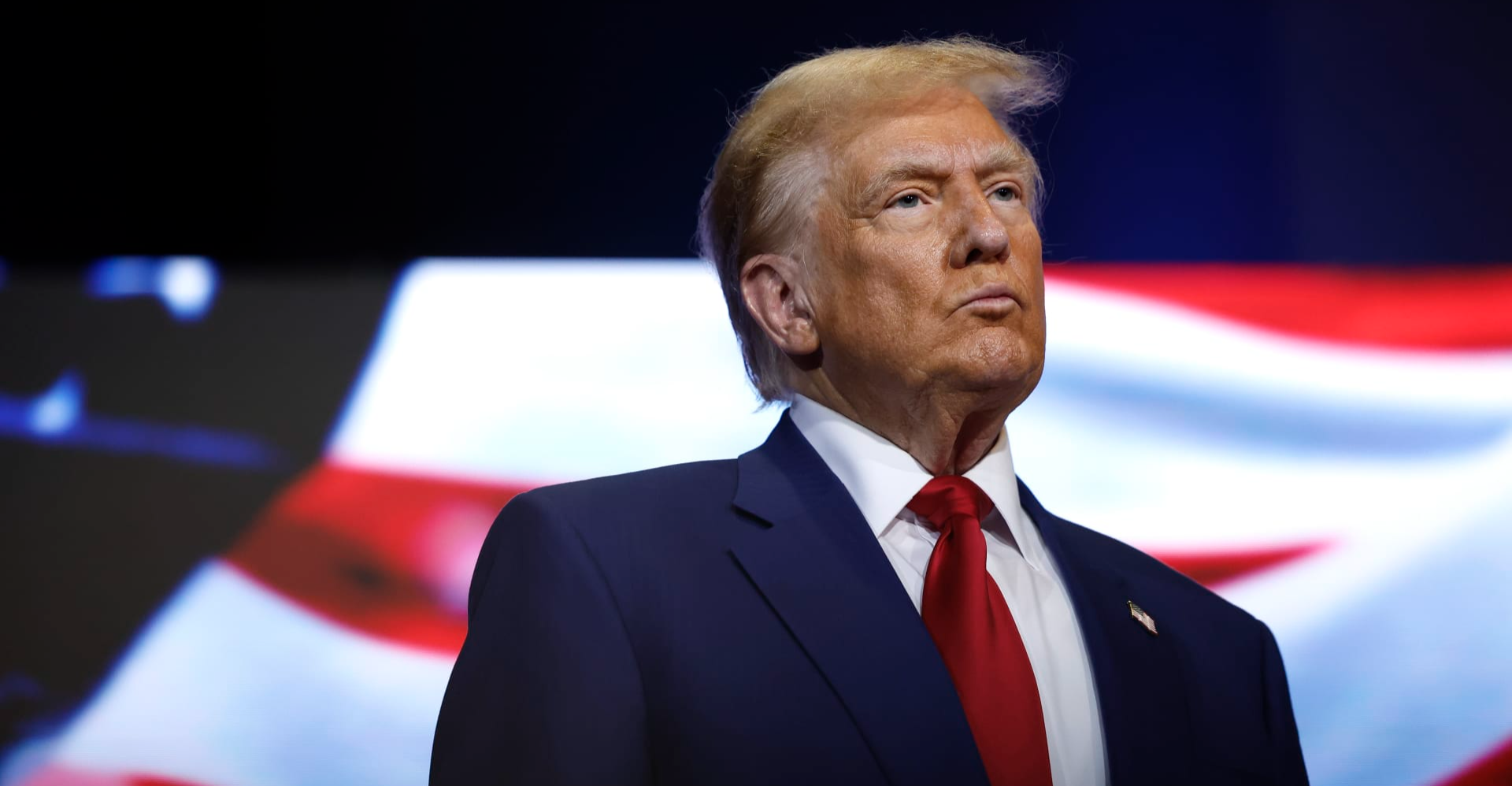 According to three informed sources cited by Axios, US President Donald Trump made two phone calls on Sunday, March 1, to Kurdish leaders in Iraq to discuss the US-Israeli war with Iran and what might follow.
According to three informed sources cited by Axios, US President Donald Trump made two phone calls on Sunday, March 1, to Kurdish leaders in Iraq to discuss the US-Israeli war with Iran and what might follow.
According to Axios, the contacts included Kurdistan Democratic Party leader Masoud Barzani and Patriotic Union of Kurdistan leader Bafel Talabani, one day after Trump authorized the bombing campaign against Iran.
According to an Axios report translated by Shafaq News Agency, the importance of the communications stems from the Kurdistan Region having thousands of fighters on the border strip with Iran, and its control over areas that are considered strategic as the course of the war develops, in addition to the close ties between the Kurds of Iraq and the Kurdish minority in Iran.
The website quoted a source familiar with the content of the calls, who described them as “sensitive,” refusing to elaborate on their content.
When asked specifically about the contacts, White House spokeswoman Caroline Leavitt declined to discuss details, saying only that Trump had been in contact with “many allies and partners in the region” over the past few days.
Erbil, which houses a US military base at its international airport, has been subjected to dozens of missile and drone strikes since the start of the military tension.
Shafaq.com
Reuters: Iran’s strikes pave the way for a Gulf-US alliance against it
Reuters: Iran’s strikes pave the way for a Gulf-US alliance against it
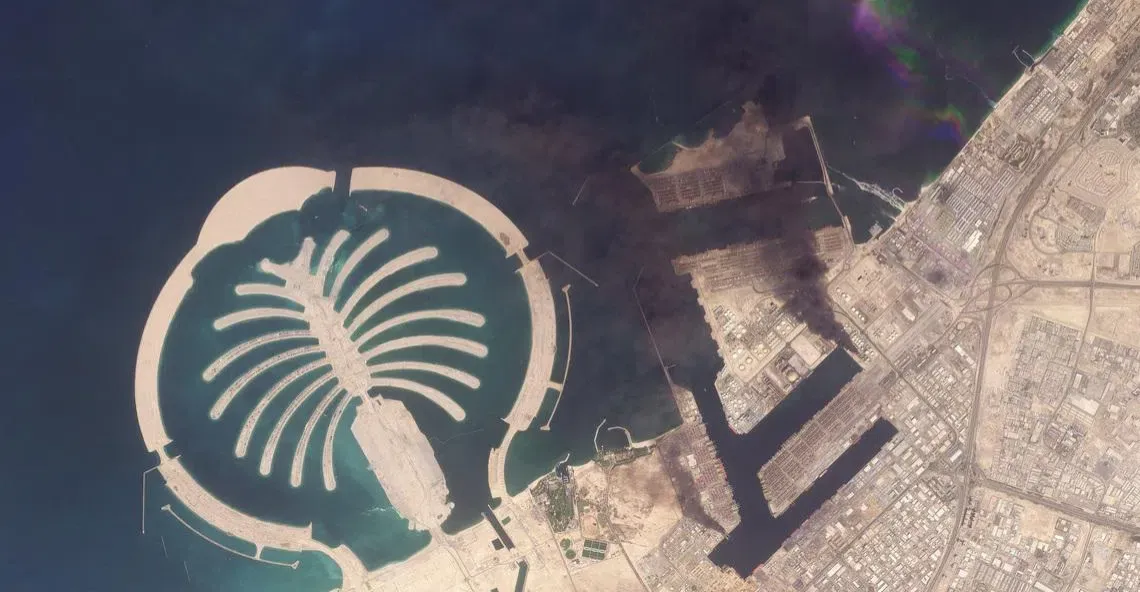 Reuters reported on Tuesday that Iranian airstrikes on Gulf states could push them to join a broad US-led coalition, potentially widening the scope of the war against Iran, following attacks targeting ports, cities and oil facilities in a vital energy-producing region, according to Middle East analysts.
Reuters reported on Tuesday that Iranian airstrikes on Gulf states could push them to join a broad US-led coalition, potentially widening the scope of the war against Iran, following attacks targeting ports, cities and oil facilities in a vital energy-producing region, according to Middle East analysts.
The agency’s report indicated that Tehran may be pushing the hesitant Gulf states to move closer to Washington – by targeting the Gulf’s economic arteries in response to US and Israeli airstrikes against Iran – and toward taking coordinated action against the Islamic Republic, according to analysts.
They added that the aim of the strikes, which targeted six Gulf states, all of which are US allies and host US military bases, was to ensure that those countries would put pressure on US President Donald Trump to stop the war, but Iran appears to have miscalculated.
The report quoted Abdulaziz Sager, head of the Saudi-based Gulf Research Center, as saying that “Gulf states now face difficult and clear choices: either to join the United States more openly in its war effort — by allowing the use of their airspace and territory and possibly participating in military operations — or to risk further escalation on their own soil.”
He added that the option of neutrality declined when Iranian missiles began to fall, which “forced us to be their enemies,” prompting countries that had previously adopted a cautious and balanced stance to openly align themselves with Washington and prepare to defend their territories and interests.
The Gulf Cooperation Council — Saudi Arabia, the United Arab Emirates, Qatar, Bahrain, Kuwait and Oman — held an emergency ministerial meeting on Sunday, invoking Article 51 of the UN Charter, setting “red lines” and indicating readiness for collective self-defense as energy disruptions and security risks escalate.
The message from the Gulf Cooperation Council to Tehran was clear and unequivocal: Iran’s attacks have contributed to strengthening the unity of the Gulf states.
He also noted that continued strikes could turn the Gulf from a defensive shield into an “active response arena,” and that Gulf states have activated joint air defense systems and reconnaissance flights across regional airspace.
According to a Reuters report, analysts say the choice is clear and decisive: either to respond and risk a wider war, or to wait and accept the erosion of security, economic stability and international credibility in light of repeated attacks.
Gulf officials confirmed that messages had been conveyed to Tehran, directly and indirectly, warning that any further attacks would have far greater consequences for the Islamic Republic.
A well-informed Gulf source said: “In practice, they will try to wait as long as possible. The Americans are hitting them and the Israelis are hitting them.”
He added that it was unclear who was pulling the strings in Iran — whether the strikes on the oil facilities were ordered centrally or carried out by rogue units.
Two scenarios appear to be taking shape: either the command structure has fractured, with some units acting independently, or decisions are still being coordinated at the highest levels.
The risks are not limited to the Gulf region alone, but extend to oil exports, shipping lanes, energy infrastructure, a vital energy corridor, and repercussions for global trade and markets.
Global energy markets are facing one of the most serious shocks they have seen in decades. Missile threats have forced some Gulf energy facilities to shut down, including Qatar’s liquefied natural gas plants – which account for about 20% of global supplies – and have revealed the impact this has had on energy markets.
The report quoted the head of the Emirates Policy Center, Ebtisam Al-Ketbi, as saying: “If the strikes continue at this rate, and the Gulf cannot withstand a prolonged conflict, or the disruption of oil shipping lanes, or the closure of the Strait of Hormuz, it will be natural for other countries to intervene, because global interests will be directly affected.”
Mohammed Bahroun, director general of the Dubai Center for Public Policy Research, said the logic of expanding the alliance against Iran has been strengthened after the United Arab Emirates described the Iranian strikes as acts of terrorism.
He added that “Iran is pushing the Gulf states towards an expanding alliance against it. By attacking the Gulf states, Iran is turning them into enemies and exposing them to the risk of a wider war that no one wants.”
The attacks on sites linked to the West – from a British base in Cyprus to facilities hosting French forces in Abu Dhabi – have also raised the possibility of NATO being drawn into the conflict eventually.
The United Arab Emirates bore the brunt of the Iranian attack, with 63% of the strikes targeting its airports, ports, and oil infrastructure. Officials estimate that 165 ballistic and cruise missiles, along with 600 drones, were launched in the first 48 hours.
The missiles that struck Doha, Dubai and Manama over the weekend also targeted the image of the Gulf states as thriving centers of finance, investment and tourism, damaging their reputation as safe and stable havens.
The missile attacks that struck Doha, Dubai, and Manama over the weekend targeted the image of the Gulf states as thriving centers of finance, investment, and tourism, damaging their reputation as safe and stable havens. Despite the United Arab Emirates’ determination to avoid a full-blown war, it quickly took diplomatic action, summoning the Iranian ambassador, withdrawing its own envoy, closing its embassy in Tehran, and pressing the UN Security Council to address the issue.
Reuters noted that Gulf officials say Iran has radically changed the diplomatic landscape by launching ballistic missiles and drones on such a wide scale.
They add that Tehran’s actions have made it more difficult for future negotiations with the United States to deal with Iran’s missile program separately from its nuclear ambitions, a position, they say, now adopted by its Sunni Arab neighbors in the Gulf and Western governments.
Shafaq.com
After Basra, Kurdistan Region oil exports via Ceyhan have stopped.
After Basra, Kurdistan Region oil exports via Ceyhan have stopped.
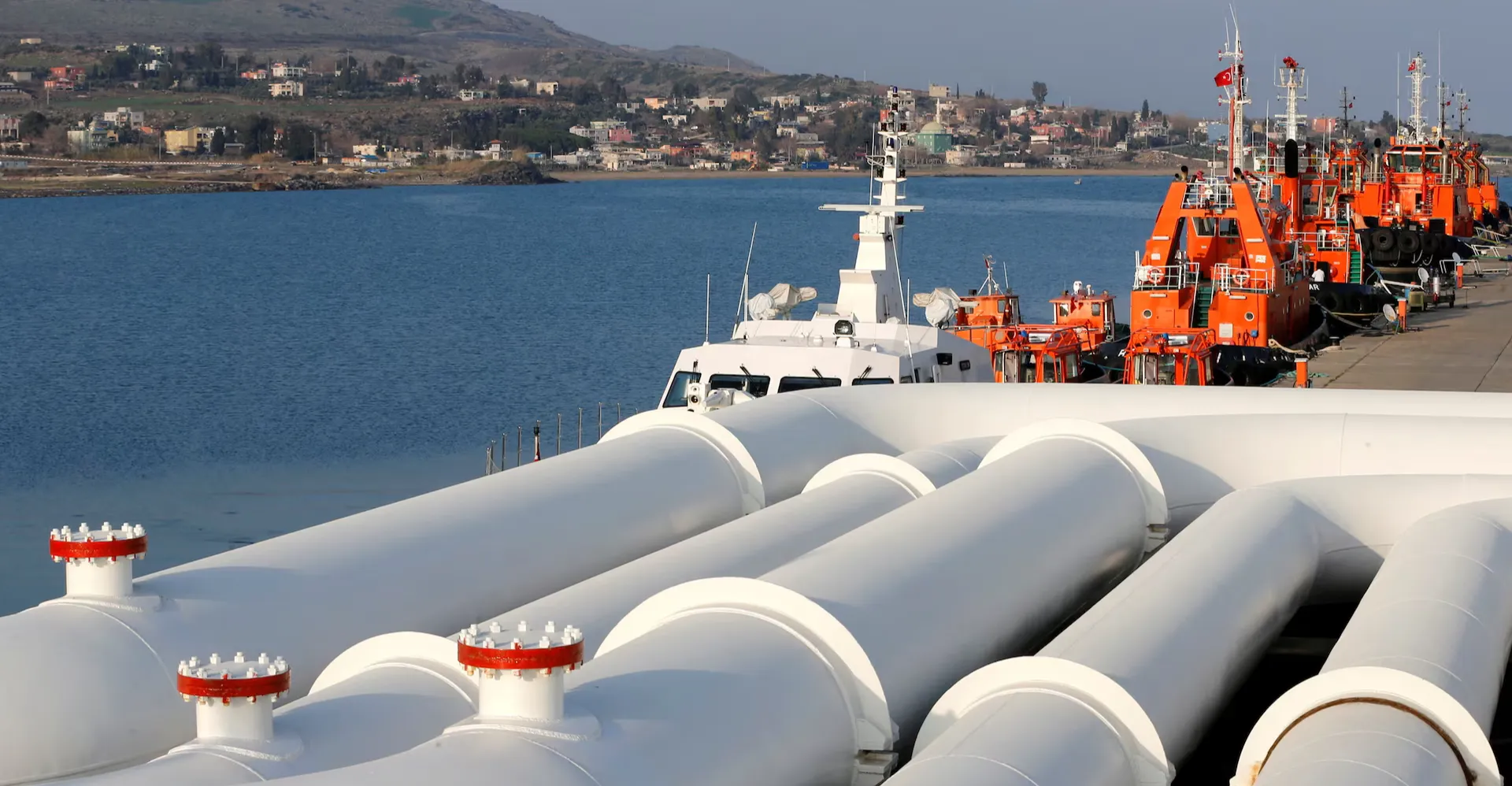 A source in the state-owned North Oil Company, based in Kirkuk province, revealed on Tuesday that the export of Kurdistan Region oil via the Turkish port of Ceyhan has stopped, following the suspension of work in some oil companies in the region.
A source in the state-owned North Oil Company, based in Kirkuk province, revealed on Tuesday that the export of Kurdistan Region oil via the Turkish port of Ceyhan has stopped, following the suspension of work in some oil companies in the region.
The source told Shafaq News Agency that “the decision to halt exports came after oil companies suspended their operations in a number of fields in the Kurdistan Region, which directly affected the quantities pumped through the pipeline to the port of Ceyhan.”
He added that “the Ministry of Natural Resources in the region informed the North Oil Company, which manages the export process, to officially notify the Federal Ministry of Oil of the cessation of pumping,” noting that “the pumping process has completely stopped today.”
The source indicated that “export volumes before the halt were around 200,000 barrels per day,” explaining that “the halt is related to the repercussions of the situation in the region and the ongoing developments.”
Earlier today, informed local sources reported that oil production had stopped at Iraq’s largest oil field, the second largest oil field in the world, Rumaila, due to the military escalation in the Middle East.
Shafaq.com
National Nuclear Regulatory Authority: We have not detected any increase in radiation levels from Iran.
National Nuclear Regulatory Authority: We have not detected any increase in radiation levels from Iran.
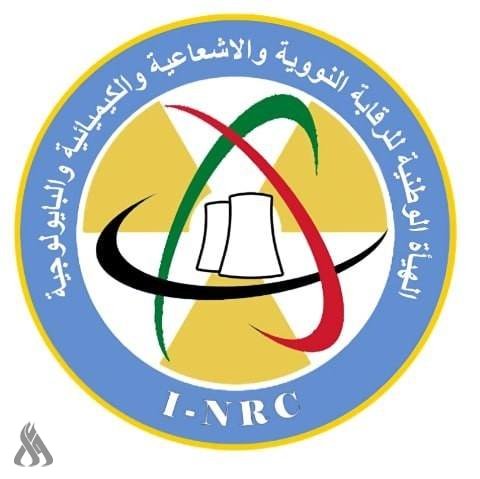 The National Nuclear Regulatory Authority announced on Tuesday that there are no indications of any increase in radiation levels from Iran. It also noted that it is monitoring early warning systems that cover Iraqi provinces around the clock. The head of the authority, Fadhil Hawi Mazban, stated in a statement, “We have all been following with great concern the military operations in the Islamic Republic of Iran and the Middle East. We were contacted by the Incident and Emergency Centre (IEC) of the International Atomic Energy Agency immediately after the outbreak of hostilities to check on the radiation levels recorded by our system’s detectors, due to the scarcity of information received from the Iranian side regarding the status of nuclear facilities.”
The National Nuclear Regulatory Authority announced on Tuesday that there are no indications of any increase in radiation levels from Iran. It also noted that it is monitoring early warning systems that cover Iraqi provinces around the clock. The head of the authority, Fadhil Hawi Mazban, stated in a statement, “We have all been following with great concern the military operations in the Islamic Republic of Iran and the Middle East. We were contacted by the Incident and Emergency Centre (IEC) of the International Atomic Energy Agency immediately after the outbreak of hostilities to check on the radiation levels recorded by our system’s detectors, due to the scarcity of information received from the Iranian side regarding the status of nuclear facilities.”
He also added that “the National Emergency Center has been activated and the early warning systems covering the Iraqi governorates are being monitored 24 hours a day, in addition to monitoring the readings of the detection systems of neighboring countries,” explaining that “no increase in radiation levels above normal background levels has been detected so far in our detectors or the detectors of neighboring countries.”
He stated that “regarding the status of nuclear facilities in Iran, we have not yet had any indication that any of the nuclear facilities, including the Bushehr nuclear power plant, or the Tehran research reactor, have been subjected to an act of war,” noting that “Iran and a number of other countries in the region that have been subjected to military attacks have operating nuclear power plants and nuclear research reactors, as well as associated fuel storage sites, and these fall within the scope of our interest and ongoing monitoring.”
He also affirmed, “We are working to the best of our ability through the Nuclear and Radiological Emergency Room, which includes various sectoral bodies and is in a state of permanent session and communication with the International Atomic Energy Agency, as our agency represents the national point of contact for the Early Warning Agreement and the Assistance Agreement.”
Burathanews.com
His office: Maliki and Barak met to discuss national entitlements and the political landscape.
His office: Maliki and Barak met to discuss national entitlements and the political landscape.
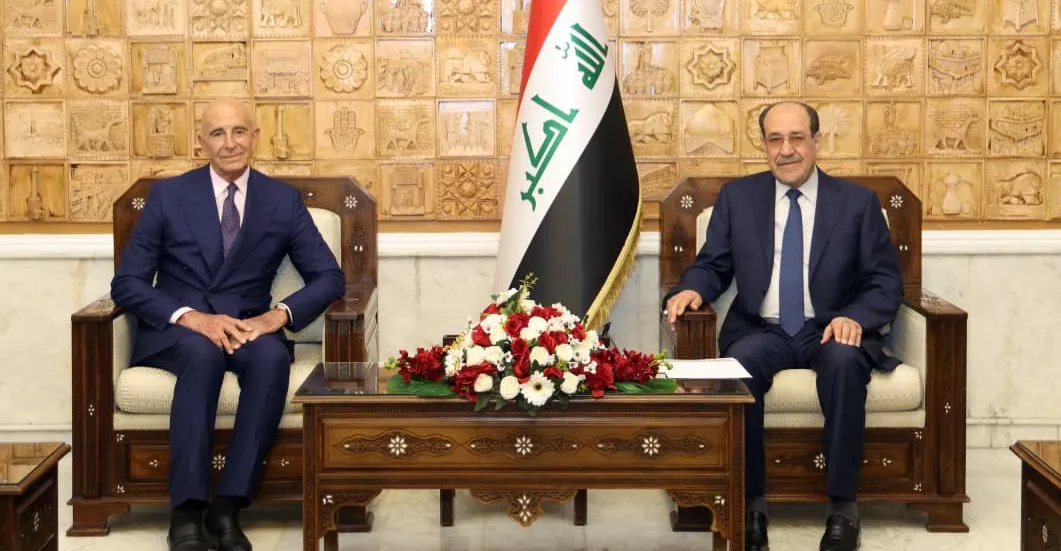 On Friday, Nouri al-Maliki, leader of the State of Law Coalition, discussed with US Special Envoy to Syria, Tom Barrack, the developments in the political scene in Iraq and the upcoming national entitlements.
On Friday, Nouri al-Maliki, leader of the State of Law Coalition, discussed with US Special Envoy to Syria, Tom Barrack, the developments in the political scene in Iraq and the upcoming national entitlements.
A statement from al-Maliki’s office, received by Shafaq News Agency, said that “al-Maliki stressed during the meeting the importance of supporting the democratic process and strengthening political stability, emphasizing the need to respect Iraq’s sovereignty and the choices of its people, while the continuation of communication and coordination between the two sides on files of common interest was emphasized.”
According to the statement, Barak also pointed to “the importance of the role that Iraq plays in the process of resolving the region’s problems, reducing the intensity of the conflict , supporting dialogue, and fighting terrorism.”
These talks come at a time when the political forces that won the elections in late 2025 are seeking to resolve the issue of candidates for the positions of President of the Republic and Council of Ministers, and to proceed with the procedures for forming the new government, steps which are legally known as the postponed “constitutional entitlements” .
This comes in conjunction with the United States giving the Shiite Coordination Framework a deadline last Tuesday, which ends today, Friday, regarding the withdrawal of the nomination of the leader of the State of Law Coalition, Nouri al-Maliki, for the position of Prime Minister, according to what an official source in the framework told Shafaq News Agency .
He added that “Al-Maliki informed the framework that he does not intend to withdraw his nomination at all, and informed them that the (two-thirds) who nominated Al-Maliki should withdraw the nomination and he does not object to that, and this is the closest thing to the scene during the next few days .”
The “coordination framework,” which includes ruling Shiite political forces in Iraq, is witnessing a division over the nomination of Maliki for the next government, amid American warnings of the repercussions of his selection, which prompted forces within the coalition to try to persuade him to withdraw in order to preserve the unity of the framework.
Shafaq.com
